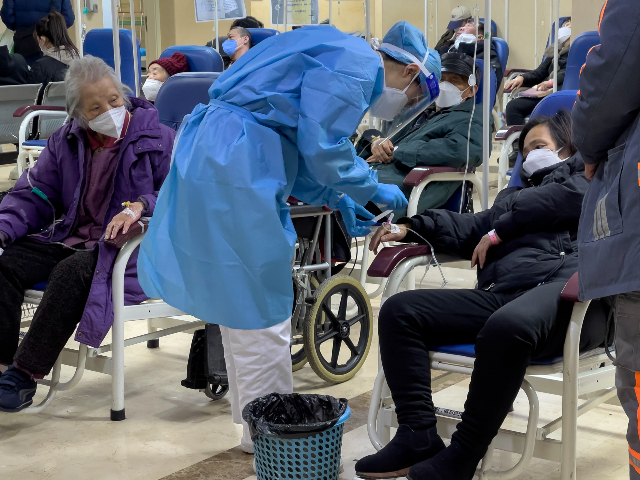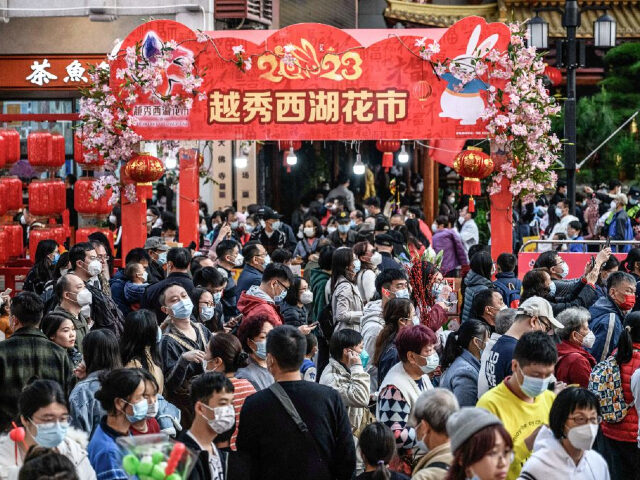Chinese Communist Party officials, including dictator Xi Jinping, spent much of the week downplaying the intensity of the ongoing outbreak of Chinese coronavirus in the country, claiming on Thursday that case rates were “relatively low” and millions traveling for the Lunar New Year should not cause a meaningful surge.
The Chinese government’s assessment of the situation differs significantly from outsider observers. The British research firm Airfinity suggested this week, using a predictive model, that Lunar New Year travel could result in 36,000 deaths a day in China attributable to the Chinese coronavirus.
Lunar New Year was the world’s largest travel holiday prior to the Chinese coronavirus pandemic, which began in late 2019 and evolved into a global catastrophe in part as a result of Lunar New Year travel in early 2020. The mayor of Wuhan, the city where the virus originated, said at a press conference that year that 5 million people left his city before the Communist Party imposed a brutal lockdown on those remaining, spreading the disease around the world. The local Party also attempted to break the record for world’s largest banquet shortly before the lockdown, bringing together upwards of 130,000 people, many of them elderly, to share a Lunar New Year meal family-style.
This year is the first in which the Chinese government is allowing relatively normal – within the confines of the “social credit system” – travel, both domestically and internationally. Chinese state media outlets predicted a surge in travel buoying the floundering Chinese economy. Government officials insisted that coronavirus cases have dwindled despite reports of overwhelmed funeral homes and hospitals, apparently an attempt to encourage more travel.

An elderly patient watches a medical worker check on a woman as they receive intravenous drips in an emergency ward in Beijing, Thursday, Jan. 19, 2023. China on Thursday accused “some Western media” of bias, smears and political manipulation in their coverage of China’s abrupt ending of its strict “zero-COVID” policy, as it issued a vigorous defense of actions taken to prepare for the change of strategy. (AP Photo/Andy Wong)
“Recently, the overall pandemic in the country is at a relatively low level,” Sun Chunlan, the despotic former Politburo member in charge of the nation’s coronavirus response, reportedly said on Thursday, according to Reuters. “The number of critical patients at hospitals is decreasing steadily, though the rescue mission is still heavy.”
Reuters noted that the bulk of Lunar New Year travel is expected to begin on Friday; the new year itself will be marked on Monday.
Xi Jinping himself, who had become relatively reclusive during the pandemic, has made several appearances at official events this week ginning up enthusiasm for the holiday, China’s largest. On Friday, the dictator attended a reception in Beijing in which he celebrated himself and his regime for its largely failed coronavirus response, suggesting that the pandemic is far from over but a return to normal is on the horizon for Chinese citizens.
“With the commitment to putting the people and lives above all else, we have constantly optimized epidemic response in light of virus development and the epidemic prevention situation,” the Chinese government’s Xinhua News Agency quoted Xi as saying.
Xi promised the Chinese people “glories and dreams” in the future, so long as they did not question the totalitarian Communist Party.
“As long as the Party stands together with the people, always remains true to the people’s aspirations and works in concert with the people, our iron-will will not be wavered by any storm, and our strides will not be stemmed by any difficulties,” he was quoted as saying.
Xi made a similar appearance on Wednesday in which he greeted health workers and transport officials, emphasizing that they would ensure regulations to limit disease spread were aptly followed.
“Through video link, Xi extended his festival greetings to passenger railway staff at Zhengzhou East Station in the central Chinese city of Zhengzhou and talked with passengers on the station platform,” Xinhua documented. “He asked the passengers if they were heading back home for family reunions or out traveling and reminded them of safety awareness during their trips.”
Xi noted that the first post-lockdown Lunar New Year is expected to bring “a major recovery of passenger flows” and “urged efforts to ensure safe and sound trips for the people and smooth and orderly flows of essential supplies.”
China’s state propaganda arms helped spread the message of security, intended to increase the number of travelers and, thus, travel profits. The Global Times, a state-run propaganda outlet, claimed on Thursday that China’s “public health experts” insisted that mass travel during the holiday “won’t trigger a large-scale epidemic resurgence,” a conclusion that many outside of the Party’s sphere of influence have not reached.
“We are seeing the peak of the epidemic declining now, with the numbers of urgent patients and severe cases both decreasing, and many hospitals have overcome the most severe situation of shortages of beds and medical staff,” a former Chinese Center for Disease Control (CDC) official told the outlet.
Chinese state media began predicting that most of the country had passed the peak of its current coronavirus wave last week.
In dramatic contrast to this observation, the British research firm Airfinity used computer models to predict this week that holiday travel could result in a peak of 36,000 deaths a day due to Chinese coronavirus infections.
“In our updated model, cases could peak at 4.8 million a day with 62 million infections predicted across a fortnight between Jan. 13-27 before beginning to fall,” Airfinity’s latest report predicted, according to the U.S.-based Radio Free Asia (RFA). “Deaths are forecast to peak at 36,000 a day on the 26th of January during the Lunar New Year Festival. This is up from our previous estimate of deaths peaking at 25,000 a day.”
RFA noted, citing sources on the ground in China, that funeral homes and crematoriums remained overwhelmed this week with more bodies than they could handle; hospitals throughout the country also appear to be struggling to take in patients. Sources speaking to the outlet said funeral homes in Shanghai were so overwhelmed they were working 24 hours a day and “adding cremation furnaces,” suggesting they expect the number of dead they need to process to increase in the near future.
RFA noted that updated Chinese government statistics revealed about 60,000 deaths related to Chinese coronavirus nationwide in a month, far higher than the initial seven, later 40, first documented in December. Death estimates increased following significant pressure from the World Health Organization (W.H.O.), whose officials repeatedly accused the Chinese government of undercounting deaths.
“W.H.O. still believes that deaths are heavily under-reported from China and this is in relation to the definitions that are used but also the need for doctors and those reporting in the public health system to be encouraged to report these cases and not discouraged,” W.H.O. Emergencies Director Mike Ryan said last week.

COMMENTS
Please let us know if you're having issues with commenting.